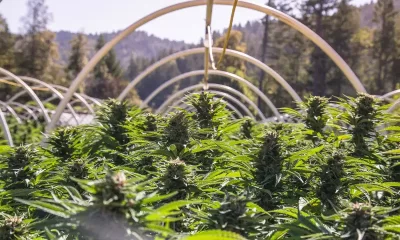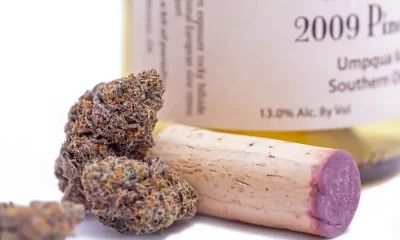Business
Seed & Smith Internships Offer Pathway to Cannabis Industry Jobs

Seed & Smith, a vertically integrated cannabis company in Colorado, has rolled out a new internship program that prepares candidates for a career in the regulated marijuana industry.
With cannabis legalization efforts continuing to succeed across the United States, the need for skilled workers in the legal weed industry continues to grow. In a recent jobs report, Leafly and Whitney Economics projected that when weed is legalized nationwide, the regulated cannabis industry could support as many as 1.75 million jobs across the country.
The report reveals that the cannabis industry currently supports 428,059 full-time equivalent jobs in the United States. Last year marked the first year that job creation in the cannabis industry exceeded 100,000 new positions. After adding 32,700 jobs in 2019 and 77,300 more in 2020, the industry added another 107,059 new positions last year.
“To put that in perspective, America’s entire financial sector added 145,000 jobs last year,” wrote the authors of the report. “The construction industry, coast to coast, added 165,000 jobs.”
Getting a Foot in the Door
But landing a job in the cannabis industry, particularly in the sector’s highest-paying positions, can seem out of reach to a lot of people. The age-old Catch-22 of needing experience to get a job while needing a job to get experience has befuddled many a job-seeker. To address the issue, Colorado vertically integrated cannabis firm Seed & Smith launched a new paid internship program this year and saw the graduation of its first candidate last month. The company is currently recruiting candidates for the next cohort of interns, with classes beginning in autumn.
Robbie Wroblewski, the marketing director at Seed & Smith, says that the company’s internship program provides a way for candidates to earn an income while they gain knowledge and experience in one of the varied employment positions in the industry.
“The goal of the program is to help candidates from each involved department (Cultivation, Extraction, Sales, Logistics and Marketing) achieve a knowledge base that prepares them for roles that are beyond entry-level positions with having little to no previous experience in cannabis,” Wroblewski explained in an email to High Times.
Seed & Smith is currently recruiting for its next intern class, which will be getting to work in September or October. Wroblewski says that the company primarily recruits at college campuses, but all interested in a career in the cannabis industry are invited to apply. Interns who are students may have the option to enroll in work-study programs and continue their professional and academic careers at the same time.
“The program is three months long and each position is paid,” said Wroblewski. “Each candidate is different but we work with colleges to ensure that college credit can be obtained for the internship as well.”
He adds that each department at Seed & Smith has developed its own curriculum for the interns, who spend time learning many aspects of the job and how they fit into the department and the cannabis industry in general.
First Intern Celebrating Graduation
Talia Sanchez-Hernandez completed her internship with Seed & Smith last month, making her the first graduate of the program. After working a couple of entry-level positions in cannabis retail and cultivation, she was ready to gain new skills and learn about other aspects of the industry. When she came to Seed & Smith to apply for a job and was told about the new internship program, she jumped at the chance for her to advance her career.
“Getting hands-on experience was one of the main things that I try to strive for working in this industry,” Sanchez-Hernandez explains in a virtual interview.
“I found Seed & Smith and they had their internship, and it just kind of really screamed at me. I’ve always wanted to do an internship,” she continues. “I actually went to school for psychology, and one of my big things was holistic medicine. Those were two things that went hand-in-hand with me.”
Sanchez-Hernandez’s internship was in the extraction track. During her studies, she learned several different methods to manufacture cannabis concentrates, including hydrocarbon extraction and distillation. The program also covered other steps in the manufacturing process such as homogenization, decarboxylation, filtration and purging, as well as best practices for smooth and safe operation of the lab.
“It’s a lot when you first see it, but everybody I worked with was really, really helpful. Everybody’s always willing to go out of the way if you need something,” says Sanchez-Hernandez. “It’s really cool. And just being here, I learned so much more in the lab, science-wise, just being hands-on.”
She adds that she has been keen to pick up new knowledge and skills in all of the positions in the cannabis industry she has held in her short career. But the focus on her professional development during her internship with Seed & Smith has been an experience like no other.
Now that she has graduated from the program, Sanchez-Hernandez is ready for her next adventure in Colorado’s regulated cannabis industry. And her success in the internship program has made it so she doesn’t have to look far.
“Talia is our first graduate and we have decided to keep her on the Seed & Smith team,” Wroblewski reports. “Given her knowledge and capabilities, we were able to place her in a mid-level management position.”
More information on Seed & Smith’s cannabis internship program is available by emailing the company’s human resources department at cbowers@seedandsmith.com.
Source: https://hightimes.com/news/seed-smith-internships-offer-pathway-to-cannabis-industry-jobs/
Business
New Mexico cannabis operator fined, loses license for alleged BioTrack fraud

New Mexico regulators fined a cannabis operator nearly $300,000 and revoked its license after the company allegedly created fake reports in the state’s traceability software.
The New Mexico Cannabis Control Division (CCD) accused marijuana manufacturer and retailer Golden Roots of 11 violations, according to Albuquerque Business First.
Golden Roots operates the The Cannabis Revolution Dispensary.
The majority of the violations are related to the Albuquerque company’s improper use of BioTrack, which has been New Mexico’s track-and-trace vendor since 2015.
The CCD alleges Golden Roots reported marijuana production only two months after it had received its vertically integrated license, according to Albuquerque Business First.
Because cannabis takes longer than two months to be cultivated, the CCD was suspicious of the report.
After inspecting the company’s premises, the CCD alleged Golden Roots reported cultivation, transportation and sales in BioTrack but wasn’t able to provide officers who inspected the site evidence that the operator was cultivating cannabis.
In April, the CCD revoked Golden Roots’ license and issued a $10,000 fine, according to the news outlet.
The company requested a hearing, which the regulator scheduled for Sept. 1.
At the hearing, the CCD testified that the company’s dried-cannabis weights in BioTrack were suspicious because they didn’t seem to accurately reflect how much weight marijuana loses as it dries.
Company employees also poorly accounted for why they were making adjustments in the system of up to 24 pounds of cannabis, making comments such as “bad” or “mistake” in the software, Albuquerque Business First reported.
Golden Roots was fined $298,972.05 – the amount regulators allege the company made selling products that weren’t properly accounted for in BioTrack.
The CCD has been cracking down on cannabis operators accused of selling products procured from out-of-state or not grown legally:
- Regulators alleged in August that Albuquerque dispensary Sawmill Sweet Leaf sold out-of-state products and didn’t have a license for extraction.
- Paradise Exotics Distro lost its license in July after regulators alleged the company sold products made in California.
Golden Roots was the first alleged rulebreaker in New Mexico to be asked to pay a large fine.
Source: https://mjbizdaily.com/new-mexico-cannabis-operator-fined-loses-license-for-alleged-biotrack-fraud/
Business
Marijuana companies suing US attorney general in federal prohibition challenge

Four marijuana companies, including a multistate operator, have filed a lawsuit against U.S. Attorney General Merrick Garland in which they allege the federal MJ prohibition under the Controlled Substances Act is no longer constitutional.
According to the complaint, filed Thursday in U.S. District Court in Massachusetts, retailer Canna Provisions, Treevit delivery service CEO Gyasi Sellers, cultivator Wiseacre Farm and MSO Verano Holdings Corp. are all harmed by “the federal government’s unconstitutional ban on cultivating, manufacturing, distributing, or possessing intrastate marijuana.”
Verano is headquartered in Chicago but has operations in Massachusetts; the other three operators are based in Massachusetts.
The lawsuit seeks a ruling that the “Controlled Substances Act is unconstitutional as applied to the intrastate cultivation, manufacture, possession, and distribution of marijuana pursuant to state law.”
The companies want the case to go before the U.S. Supreme Court.
They hired prominent law firm Boies Schiller Flexner to represent them.
The New York-based firm’s principal is David Boies, whose former clients include Microsoft, former presidential candidate Al Gore and Elizabeth Holmes’ disgraced startup Theranos.
Similar challenges to the federal Controlled Substances Act (CSA) have failed.
One such challenge led to a landmark Supreme Court decision in 2005.
In Gonzalez vs. Raich, the highest court in the United States ruled in a 6-3 decision that the commerce clause of the U.S. Constitution gave Congress the power to outlaw marijuana federally, even though state laws allow the cultivation and sale of cannabis.
In the 18 years since that ruling, 23 states and the District of Columbia have legalized adult-use marijuana and the federal government has allowed a multibillion-dollar cannabis industry to thrive.
Since both Congress and the U.S. Department of Justice, currently headed by Garland, have declined to intervene in state-licensed marijuana markets, the key facts that led to the Supreme Court’s 2005 ruling “no longer apply,” Boies said in a statement Thursday.
“The Supreme Court has since made clear that the federal government lacks the authority to regulate purely intrastate commerce,” Boies said.
“Moreover, the facts on which those precedents are based are no longer true.”
Verano President Darren Weiss said in a statement the company is “prepared to bring this case all the way to the Supreme Court in order to align federal law with how Congress has acted for years.”
While the Biden administration’s push to reschedule marijuana would help solve marijuana operators’ federal tax woes, neither rescheduling nor modest Congressional reforms such as the SAFER Banking Act “solve the fundamental issue,” Weiss added.
“The application of the CSA to lawful state-run cannabis business is an unconstitutional overreach on state sovereignty that has led to decades of harm, failed businesses, lost jobs, and unsafe working conditions.”
Business
Alabama to make another attempt Dec. 1 to award medical cannabis licenses

Alabama regulators are targeting Dec. 1 to award the first batch of medical cannabis business licenses after the agency’s first two attempts were scrapped because of scoring errors and litigation.
The first licenses will be awarded to individual cultivators, delivery providers, processors, dispensaries and state testing labs, according to the Alabama Medical Cannabis Commission (AMCC).
Then, on Dec. 12, the AMCC will award licenses for vertically integrated operations, a designation set primarily for multistate operators.
Licenses are expected to be handed out 28 days after they have been awarded, so MMJ production could begin in early January, according to the Alabama Daily News.
That means MMJ products could be available for patients around early March, an AMCC spokesperson told the media outlet.
Regulators initially awarded 21 business licenses in June, only to void them after applicants alleged inconsistencies with how the applications were scored.
Then, in August, the state awarded 24 different licenses – 19 went to June recipients – only to reverse themselves again and scratch those licenses after spurned applicants filed lawsuits.
A state judge dismissed a lawsuit filed by Chicago-based MSO Verano Holdings Corp., but another lawsuit is pending.
Source: https://mjbizdaily.com/alabama-plans-to-award-medical-cannabis-licenses-dec-1/
-

 Business2 years ago
Business2 years agoPot Odor Does Not Justify Probable Cause for Vehicle Searches, Minnesota Court Affirms
-

 Business2 years ago
Business2 years agoNew Mexico cannabis operator fined, loses license for alleged BioTrack fraud
-

 Business2 years ago
Business2 years agoAlabama to make another attempt Dec. 1 to award medical cannabis licenses
-

 Business2 years ago
Business2 years agoWashington State Pays Out $9.4 Million in Refunds Relating to Drug Convictions
-

 Business2 years ago
Business2 years agoMarijuana companies suing US attorney general in federal prohibition challenge
-

 Business2 years ago
Business2 years agoLegal Marijuana Handed A Nothing Burger From NY State
-

 Business2 years ago
Business2 years agoCan Cannabis Help Seasonal Depression
-

 Blogs2 years ago
Blogs2 years agoCannabis Art Is Flourishing On Etsy













